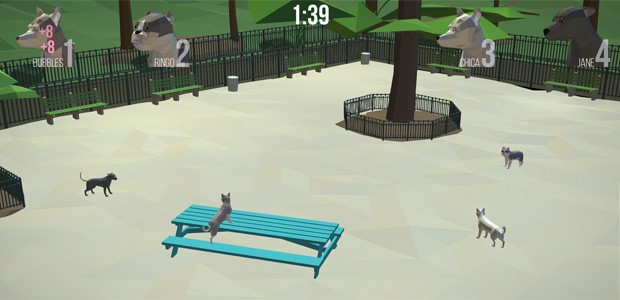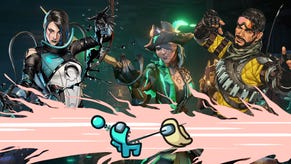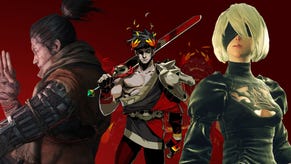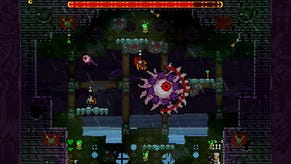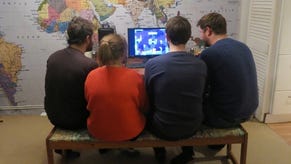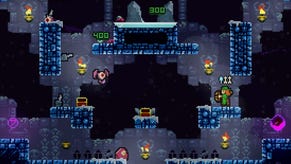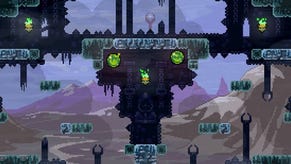Party Games: Dog Park And GameCity’s Grand Finale
Party Down Down Up Up Left Right
Every month, we dispatch Brendan to some of gaming’s best blowouts to schmooze and play party games with the partygoers. This week, he visits GameCity, pretends to be a dog, and listens to some spoken word performances about games.
It’s Saturday night and I’m standing in one of Nottingham’s oldest pubs, where a Tekken 3 arcade cabinet is blinking in front of me. Two of the bar’s regulars have just challenged me to a game. My opponent picks Jin out of the line-up, his favourite character. Meanwhile, his friend explains something to me - this cabinet has something of a personality. The joystick on the Player 2 side does not recognise ‘up’ or ‘down’ commands. But because this pair are always here, always playing this machine, they will let me use the Player 1 controls, effectively handicapping themselves. I put my drink down on the game’s bonnet and prepare myself. The time is approximately 1am. I have selected Law.
Five hours earlier I was skittering around in the dark, cavernous insides of GameCity’s final night party, playing whatever I could get my hands on. GameCity is an annual festival, almost universally adored by its participants (although I would say that, having worked with them). There are talks, workshops, live podcasts, interviews and a four-storey building in the town centre full of screens, a platter of games changing slightly every day. It’s the kind of event where you can see three kids huddled in a dark corner playing Micro Machines on an old Mega Drive. Or bounding around a tiny closet of a room, whacking big red buttons in some kind of digitally remastered Whack-a-Mole.
But the daytime stuff, where adults are encouraged to bring the kids along, is not why I’m here. I’m here for the party. The festival finale.
“Imagine a games party. But cool,” says Adam Dixon, one of the organisers. We are talking in the Nottingham Contemporary - an art gallery and events space. The type of building with lots of shiny surfaces and high ceilings, lots of thick glass, lots of geometrically perfect bar staff.
A games party, but cool? But that’s loads of them, I say.
“Yeah, but look,” he says, perhaps struggling for a good hook. “We’re in an art space. It’s art!”
“Look at that floor,” he says. “You could eat tapas off that floor.”
The other party-goers are milling around waiting for the main hall to open. When it does, the doorway reveals a dark expanse full of flashing corners and a single wide stage. Towerfall: Ascension immediately reels in an audience. It is a rambunctious extravaganza of four-player bow and arrow warfare. Something that is so much game, Graham described it as an ubergame, an ultrogame, or possibly a hypergame. Later, I would pick up the controller, take a pew and, for the shortest time, become a Towerfall champ. But Tom Smith, reprobate game jammer, would not sit by and allow this for long. I cannot remember exactly what he said when he staged his arrow-happy comeback, but it may have been something like: “Ha ha ha.”
The first game I play, however, is Dog Park. It is instantly my favourite thing in the room. Four players must compete to be the doggiest dog. You run around an enclosed park and let out your inner canine. There is a button for barking. There is a button for bounding, a button for sprinting, a button for mounting other dogs and ‘wrasslin’. All these actions earn you points and the person with the most points at the end wins. Even watching this play out is a tiny joy, as one labrador sprints round a tree in endless circles, while a bulldog leaps on top of a picnic table, barking at the others so that there can be no disputing his rightful place as ‘king of the table’ (an award worth dozens of points in itself).
It is a wonderful, surprisingly realistic vision of what it is to be your own best friend. Players are competing not simply to be the best dog, but the most dog. It is brill. Or at least it is whenever the highly unstable alpha build is not throwing a wobbler, turning half the dogs invisible or upside down. RPS’ own Philippa Warr is here playing with me (she is the one taking the nice photos). She places her drink down beside the screen, looking slightly confused. Her dog has dropped into that horrible netherworld, beneath the ground, where so many of our bugged-out heroes end up. Still, Dog Park is a joy when it works. More non-anthropomorphic animal games please.
I potter around, taking the rest in. Secretly, I enjoy Michael Brough’s arcade cabinet more than the remainder of things on show, probably because it is so strange and unexpected. This cabinet, sitting quietly in a corner of the hall, houses a two-player version of a game called BECOME A GREAT ARTIST IN JUST 10 SECONDS. On first look, this is just randomised MS Paint, viewed through some TV static. But soon you realise that the buttons change the style of your teammate’s brush or the behaviour of the canvas - and that these styles, sporting names like ‘Gender’ or ‘Rue’, can be learned. Pip watches as Tom Smith and I put the finishing touches on our final masterpiece - an abstract green and white wavelength. “You’ve essentially made a Winamp skin,” she says. Yes. But it is OUR Winamp skin. I am unexpectedly proud of the piece of crap we have just created. This must be how Damien Hirst feels.
As the night goes on, I become more and more aware of the voices from the stage. Throughout the night, people have broken away to watch as people perform spoken-word pieces about gaming and life. There has been an atmosphere, throughout my time at GameCity, of a people on the defence. And it would be unrepresentative to omit this air of disquiet from any article about the event. The previous night’s videogame karaoke was full of references to the Hashtag Which Shall Not Be Named. Lyrics lamenting the conflict within the industry. Journalists shouting down the microphone at the closing of their song, like rockstars trying to rally defiance against an unpopular war. You can see the reasons for this. At the start of the weekend, a fresh round of doxxing occurred and several game developers' personal details were leaked. The reaction, although tinged with uneasiness, has been one of shoring up.
This is where the likes of Christos Reid and Hannah Nicklin come in - two of the spoken-word performers that wander onstage at different times during the night. In one sense, they are here to put the arty in this party. But in another, they are the morale officers to a frustrated and (literally) threatened group. Christos, an independent developer, has already given a talk with Zoe Quinn about mental health and games, and his performance expands on that, with a sobering poem about OCD.
“I complete the quests, hands are at rest, but the voices in my head never quite go away. /
Go back, go back, the germs will attack, your family will burn, their skin turning black /
It’s now or never, tap thirty-eight times, or you’re responsible for all of these crimes.”
Later in the night, Hannah Nicklin, a theatre maker and games writer, does something a little different. Two days ago, she isolated herself in one of GameCity’s rooms and spent a day collecting stories and swapping them with others like it was a trading card game. I say ‘like’ a trading card game but what I mean is she really did make a trading card game out of this. Each card has the title of a story on it and she has to remember the stories and re-tell them to the recipients, taking a new story from them in its place.
Now, on the final night, she performs an account of all the stories she traded. It is not long before she has almost the entire room listening, half of them sitting cross-legged on the floor, like school children. The conceit of this, almost a party game in itself, compels me to join the audience. One story in particular stands out. It is called ‘Sharing Strategies’.
“Sharing Strategies is a story of a certain kind that I really enjoyed hearing -
about the games around games -
who gets first play on a new single player game,
how the controller is moved around a group of friends playing a Fighter on Story Mode.Sharing strategies is set in the late 90s, Nairobi, Kenya.
Two brothers go over to their friends’
watch TV until the power cuts out.
This isn’t unusual,
They only really get a couple of hours of power a day.
Reluctantly they go outside and play games in the dusty street.And then they remember - one of them recently got a GAMEBOY.
They race home, turn on the console, load up the only game they have - an arcade fighter of some kind - and crowd round
they play by the rule commonly accepted around the globe:
‘You lose, it’s someone else’s go’.
To begin with everyone cheers, advises, shouts moves and strategy.
Then, as it goes on, and each player gets better, the advice slows,
the cheers get quieter, you want them to win, but also,
you want to have a go,
and you’re increasingly aware that there’s no power, and,
eventually,
the battery will run out.”
At the risk of turning an article about dumb games featuring dogs scratching themselves into an article about Ahrt, Dahrling, the idea of ‘games around games’ is critical to the party game. Good local multiplayer will allow for players to come up with their own ridiculous rulesets within the confines of the game. The gentlemanly throwing away of rapiers during a sudden death match in Nidhogg. An agreement between three swordsmen to only attack the person currently winning in Samurai Gunn. A race to climb the flat walls of Gang Beasts, winner takes all, losers destined for the incinerator. The customs we hold outside of the game are an extension of this. Between my family and friends, the rule for passing the controller was enshrined in a single alliterative phrase, an incantation repeated by all before the machine had even been switched on.
“Life by life, level by level.”
I put my drink down on the bonnet of the Tekken 3 cabinet. It is approximately 1am. Law bounces around at my behest, doing cartwheel kicks and Bruce Lee jabs. I am feeling pretty good about my chances. I have done one of those things, you see, where you go back to the start of your story, thus making it cyclical and profound.
I win against one of the regulars, but the other, the one who chooses Jin, defeats me. His friend points out the tattoo on the winner’s bicep. I have to do a double-take, my Guinness clamours to go back in my pint glass. It is the same tattoo that Jin has: a long, tribal emblem. The regulars dissolve into the night, triumphant. But the Tekken machine keeps on giving. Throughout the night, people crowd round, new challengers come and go. It is only when Hannah Nicklin, the spoken-word performer, shows up for a brawl that I realise we have been doing exactly what the story Sharing Strategies was all about. As a crowd, we have been yelling, cheering. And we have established a new rule, a code of honour for this special, personable machine. From now on, neither player can use ‘up’ or ‘down’.
This article was funded by the RPS Supporter program.




